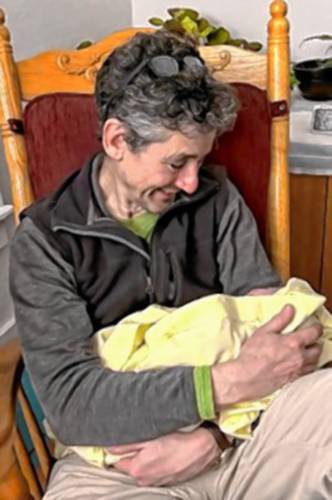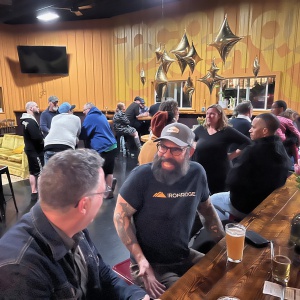Retiring VA doc lets DOGE ire fly: List details deleting pronouns, making Musk dartboard

Dr. William Cutler, an internist at the Central Western Massachusetts VA since 2008, sent a “facetious” response to the Department of Government Efficiency to a request that he outline five weekly bullet points justifying his work. CONTRIBUTED PHOTO
|
Published: 03-11-2025 10:17 AM
Modified: 03-11-2025 5:55 PM |
NORTHAMPTON — Amid cuts comprising about 82,000 Department of Veterans Affairs employees and form emails being sent en masse to federal employees asking for five weekly bullet points justifying their work, William Cutler is just trying to care for veterans and get to retirement.
According to a leaked internal memo sent by VA Chief of Staff Christopher Syrek on March 5, the department is being directed to work with Elon Musk’s so-called Department of Government Efficiency to return the agency to 2019 staffing levels in an effort to “eliminate waste.” The memo came amid a wave of similar cuts across various federal agencies, as well as emails from the federal Office of Personnel Management (OPM) requiring federal employees to send weekly emails containing five bullet points about their work.
Musk wrote in a post on his platform X that failure to respond to these emails “will be taken as a resignation,” but the OPM email did not mention the resignation threat.
When Cutler, an internist who has worked with the Central Western Massachusetts VA since 2008, first received the initial email request, he had already long been planning his April retirement, and decided to give a “facetious” response.
Cutler’s five-bullet email, addressed to DOGE, outlines work he did calculating employee time spent in meetings discussing emails “urging us to resign,” and purging mentions of diversity, equity and inclusion as well as pronouns from his work computer and medical notes. He also highlights covering a dartboard with a picture of Elon Musk, and rewatching the Woody Allen movie “Bananas,” in which a new leader requires that all citizens change their underwear four times a day and wear them “on the outside so we can check.”
He concludes his email “and oh yeah. I also cared for U.S. veterans of our armed forces who suffer from chronic pain, but that bit may not be as interesting to you.”
When he sent this response in, he said he got a follow-up email asking him to submit responses again. When he got an email requesting that these emails be sent every week, he decided that he wasn’t going to respond to any of them anymore.
Cutler said he doesn’t believe that the emails are a “genuine effort to improve care or improve efficiency of VA health care.”
Article continues after...
Yesterday's Most Read Articles
 Two arrested on drug trafficking charges in Greenfield
Two arrested on drug trafficking charges in Greenfield
 Berkshire DA says no crime occurred in student-officer relationship at Mohawk Trail
Berkshire DA says no crime occurred in student-officer relationship at Mohawk Trail
 Four Red Fire Farm workers arrested as part of ICE operation in Springfield
Four Red Fire Farm workers arrested as part of ICE operation in Springfield
 Incandescent Brewing now open in Bernardston
Incandescent Brewing now open in Bernardston
 Local ‘Hands Off!’ standouts planned as part of national effort
Local ‘Hands Off!’ standouts planned as part of national effort
 Proposed ordinance would make Greenfield a ‘sanctuary city’ for trans, gender-diverse people
Proposed ordinance would make Greenfield a ‘sanctuary city’ for trans, gender-diverse people
“My own personal feeling is that none of us should respond to these emails because it’s a harassment technique that doesn’t follow the lines of authority under which the VA has been operating,” he said.
Cutler said that because the emails came from a “national source” and have gone out so widely to so many federal employees, he doubts that a human even looks at the responses, and sees it more as an intimidation technique than an effort to improve the VA’s care. He likened it to someone saying, “I’ve got my eye on you, I’ve got my eye on your job.”
“I don’t believe that the responses to that email are of any interest to the people who sent that email,” he said.
But Cutler also said the Central Western Massachusetts VA has done a good job, in his opinion, of trying to respond to the uncertainty among its employees. They have been holding more of what they call “town hall meetings” to address concerns and questions as well as they can. But anxiety is still in the air among many VA employees.
He said he has loved working for the VA, and he has “tremendous respect” for all of the people he has worked with over the years. Now, his plan is to keep doing his job, which is providing care the way he was trained to provide it, until his retirement.






 Literacy Project celebrating 40 years of education
Literacy Project celebrating 40 years of education River Rat Race returns for 60th year on April 12
River Rat Race returns for 60th year on April 12 Backyard Oasis, connecting older adults with podcasts, celebrates 50 episodes
Backyard Oasis, connecting older adults with podcasts, celebrates 50 episodes
